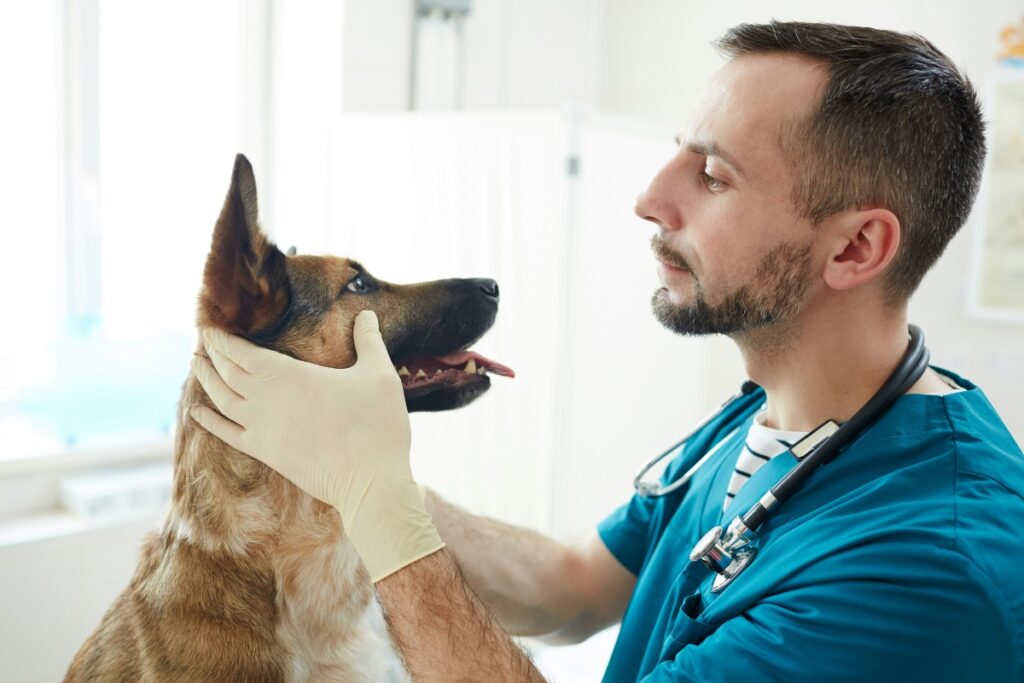
Bringing your pet to the Rainbow Nation? We’ve handled a substantial amount of pet exports to South Africa — let us help with yours.
Pet travel to South Africa doesn’t have the strict rabies vaccination and quarantine rules of some countries, but that doesn’t make travel to the country easy. Dogs in particular face complex testing requirements that can overwhelm even the most experienced travelers.
We’ve put together a guide to help you get a better understanding of bringing your cat or dog to South Africa, including when it may be best to call in the experts to ensure nothing is missed.
Eligible Pets and Country Restrictions
South Africa allows the import of cats and dogs that are at least 3 months old with relevant permits and health certificates. All other live animals require prior authorization from the Registrar of Animal Improvement.
All pets, no matter their size, must travel in the cargo hold of the airplane for import into South Africa. There may be additional breed restrictions set by the airline.
Eligible Pets
South Africa does not have an active ban on certain cat or dog breeds. The airline you work with for your international pet transport may have breed restrictions, though. Here’s a rundown of restrictions from airlines we use for flights to South Africa from the U.S. most often:
- Emirates SkyCargo: Strong-jawed breeds are allowed in reinforced travel crates and kennels on Emirates’ cargo arm. Snub-nosed breeds are limited to cargo travel during winter (November to April) with additional “fit to fly” health certificates.
- KLM: Snub-nosed pets are not allowed in the hold on KLM flights, but they may be allowed in cargo on Air France KLM Martinair Cargo. Additional breed restrictions apply to extra-large dogs (e.g. Great Danes).
- Lufthansa: Snub-nosed breeds (e.g. bulldogs, Boston terriers, and boxers) are not allowed in cargo on Lufthansa. They may be allowed as air freight on Lufthansa Cargo. Dogs described as “fighting dog” breeds must travel in a reinforced crate.
Dog breeds that appear on many airlines’ lists as dangerous or strong-jawed typically include the following:
- American Bully
- American Bulldogs
- American Staffordshire Terrier
- Dogo Argentino
- Kanga Shepherd Dog (Turkish Kangal Dog)
- Caucasian Shepherd Dog (Caucasian Ovcharka)
- Rottweiler
- Tosa
- Mastiff (all breeds)
Some of these breeds, like most mastiffs and bully breeds, overlap with snub-nosed varieties. Depending on your route, the airline may have additional restrictions on extra-large pets due to space requirements.
If you’re traveling with a breed that needs a reinforced crate, we can provide custom-built CR82 crates to meet that requirement. These crates are made from more durable materials to withstand escape attempts.
Approved Countries
South Africa does not have a list of approved countries for pet imports, but pet owners from some countries do face additional animal travel requirements upon arrival. Depending on the country of export, a dog may face a 14-day quarantine in South Africa to meet import requirements. (The United States is not on this list.)
Microchip and Vaccinations
Cats and dogs traveling to South Africa must receive an ISO-compliant microchip before their rabies vaccinations.
Microchip
All cats and dogs must have an ISO-compliant microchip that can be read upon arrival in South Africa. Microchip information should match across all vaccination and health-related forms. Identifying tattoos won’t be accepted as a microchip alternative.
Vaccinations
Cats and dogs traveling to South Africa must do so with a rabies vaccination. Vaccines should be done within 12 months but no less than 30 days prior to a pet’s export. Any U.S.-licensed rabies vaccine is appropriate for South African import permits.
The only exceptions to rabies requirements are pets coming from the United Kingdom, Australia, or New Zealand. As South Africa is considered high risk for rabies, it’s best practice to vaccinate pets against rabies no matter the origin point.
No additional vaccines are required for entry into South Africa, but your veterinarian may recommend that your pet is up-to-date on other vaccinations. Those may include the following for dogs:
- Canine distemper
- Infectious canine hepatitis
- Canine parvovirus
- Canine parainfluenza
- Bordetella bronchiseptica
- Leptospirosis
The following vaccines are recommended by most vets for traveling cats:
- Feline rhinotracheitis
- Feline calicivirus
- Feline panleukopenia (enteritis)

Blood Tests and Treatments
Cats and dogs are not required to arrive with rabies titers, but dogs are required to have proof of negative tests for 5 different diseases or infections within 30 days of their export date.
South Africa has strict rules about which tests are appropriate for each of those 5, and health paperwork that doesn’t include approved testing methods or labs will be rejected. (The only exception is prior approval from South Africa’s Animal Health Department.)
Dogs that test positive for any of the diseases listed are not allowed to enter South Africa. Missing or incorrect testing could mean quarantine time for your pet or a return trip to their home country.
Let’s take a closer look at required testing for dogs traveling to South Africa:
- Babesia gibsoni: Testing for this tick-borne parasite must either happen by an immunofluorescence antibody test or ELISA using the BgTRAP antigen AND the Giemsa blood smear or real-time PCR.
- Brucella canis: Testing for B. canis must happen by serum agglutination OR rapid slide agglutination test.
- Dirofilaria immitis: Testing for Dirofilaria immitis (heartworm) must happen by a microfilarial filtration test.
- Leishmania: Testing for this parasite must happen by indirect fluorescent antibody test, ELISA test, a direct agglutination test, or a Western blot/membrane immunoassay.
- Trypanosoma evansi: Testing for this parasite must happen by card agglutination test AND a Giemsa blood smear.
An added layer of complexity for Trypanosoma evansi is that testing must be done by an OIE Reference Laboratory. (All of the others can be completed by a U.S.-based official lab.) For samples from the U.S., that means a shipment to the Institute of Tropical Medicine Antwerp in Belgium.
This goes beyond sending samples from the post office. The lab recommends that submitters either work with a commercial lab to handle shipping or set up tracked shipping through DHL.
All samples must have shipment tracking numbers sent to the institute ahead of time to avoid them being returned. Samples should come with special labeling and a copy of import permits.
Dogs must also show a history of at least one Dirofilaria immitis (heartworm) treatment after they’ve received a negative test result for it. Finally, all dogs should be treated with an acaricide and insect repellent targeting ticks and flies (not fleas) within 30 days of their departure.
This can be a combination product or an individual product if one doesn’t cover both ticks and flies. Your vet is a good resource for finding a product that meets these requirements and won’t interact with your dog’s heartworm medication.If this sounds overwhelming, that’s because it is. South Africa has some of the more complex requirements of any country when it comes to blood testing. Our pet experts can help you navigate through the layers of testing and treatments for as efficient an arrival as possible.
Import Documents
Cats and dogs traveling to South Africa need veterinary import permits to enter. Apply for permits from the Director of Animal Health with proof of payment to the National Department of Agriculture. Permits won’t be processed without proof of payment.
Email VetPermits@daff.gov.za for the correct permits, or work with a professional pet shipping company to handle the import documents. This is also where you can email completed permits unless you’re sending them by fax or mail.
Once permits are approved, they are returned to you with relevant information for completing the required veterinary health certificates. Before travel, take both the import permit and certificate instructions to a USDA-accredited veterinarian for completion, endorsement, and a full exam.
Once permits are received, they are good for 6 months. Health certificates must be endorsed within 10 days of your pet’s travel date.
At Tailwind, we have model health certificates from years of experience with complex itineraries to ensure we don’t miss anything for travel to South Africa or anywhere else in the world. That’s not just a perk of working with a pet shipper. It provides you with peace of mind that your pet will get to where they’re going safely and efficiently.


Airline Options
While many American airlines fly to South Africa, they’re not all pet-friendly. At Tailwind, we frequently work with Lufthansa as our preferred carrier for pet travel to South Africa. Emirates and KLM are additional options with frequent flights for pets to/from South Africa to the U.S.
We’ve already discussed possible breed restrictions for each, but it’s important to check on additional airline requirements for your pet once you’ve decided on an itinerary.
All flights have limits on the number of pets they can transport, and there are extra rules around crate size and weather restrictions.
Quarantine
Mandatory quarantine periods of 14 days are applicable for dogs arriving from certain countries, but the U.S. is not on that list. Dogs and cats arriving without the necessary vaccination and testing requirements may be subject to quarantine upon arrival at the importer’s expense.
Dogs that need to be quarantined can only arrive in South Africa via O.R. Tambo International Airport in Johannesburg or Cape Town International Airport. Cats and dogs that don’t require quarantine can also enter through King Shaka International Airport in Durban.
Returning to the USA
South Africa is considered a high-risk country for rabies. Pets arriving from South Africa with the U.S. as their destination country must then comply with CDC requirements upon arrival to pass customs clearance.
For dogs with a history of rabies vaccines in the U.S., you need a CDC Dog Import Form receipt and a Certification of U.S.-issued Rabies Vaccination form. You can substitute the latter for an export health certificate endorsed by the USDA until July 31, 2025.Without these documents, your dog will need a rabies titer before they leave to comply with CDC requirements. If you’re traveling to South Africa for less than 3 years, make sure you have a U.S.-certified, updated rabies vaccine before you leave that won’t expire while you’re away.
Need support shipping your pet within the U.S.? We can help
How Tailwind Can Help
International pet relocations are never simple, but they become even more complex in countries like South Africa that require navigating the logistics of testing requirements.
At Tailwind, we work with clients from the initial booking to their pet’s arrival at their new home, and we’re well-equipped to handle any hiccups or extra hassles that come up along the way.

Ready to get started? EachReady to get started? Each situation is a little different, so contact us to get an idea of the costs involved.
See What Our Clients Have to Say

“Brady was absolutely fantastic, getting our doggies to us safe and sound and happy! He communicated with me every step of the way and was most accommodating of our situation. Gemima and Paddington are so happy to be back with us after their long trip from South Africa. Thank you!”
– Sonja L.

“As a result of CDC Permit delays we changed our relocation plans at short notice from SFO to LAX. Brady you and the team have been amazing! Always taking calls from a very stressed mom but most importantly taking care of Lily! She was happy and beautifully groomed. This was by far the most stressful part of our relocation. You guys made it easy! A 1000 Thank You’d from the Le Roux family”
– Petro
